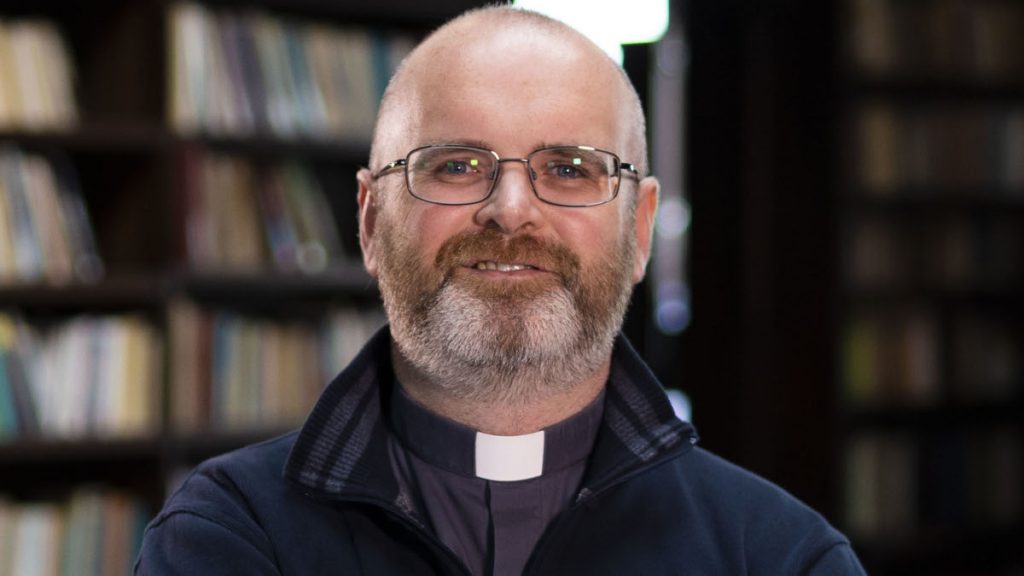Novitiate
The first two years of Jesuit formation is a school of the heart. Its goal is the verification of your vocation to the Society through discernment in the various probations and experiences.
Ad Majorem Dei Gloriam was a phrase used by St Ignatius of Loyola which became the motto of the Jesuits. Everything we do and every decision we make, whether great or small, we want it to be for the greater glory of God. For this is the meaning of life— to glorify God. Our vocation is the specific way that God calls us to do this. Have you given much thought to your vocation? If the idea of being a priest or a religious brother attracts you then you might want to explore the possibility of becoming a Jesuit. Becoming a Jesuit is a process of learning, discerning and deciding.
We are a Catholic apostolic religious order of priests and brothers, founded by St. Ignatius of Loyola and his companions in 1540.
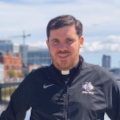
Patrick Corkery SJ
The word Jesuit is derived from our official name, the Society of Jesus. Jesuit spirituality is Christ-centered and missionary— we are men of prayer and men of action. In the Spiritual Exercises, the retreat composed by St. Ignatius himself, we meditate on Jesus’ life, asking for the grace to know, love and follow Him more and more. We live in community where the Eucharist and the Examen prayer are central to our day. The Society is also consecrated to the Sacred Heart of Jesus.
Jesuit priests celebrate Mass and the Sacraments, but St. Ignatius’ vision for us was to be engaged in a wide variety of apostolic roles: teachers, school and university chaplains, spiritual directors, givers of retreats and the Spiritual Exercises, missionaries, philosophers, theologians, carers of the poor and, more recently, of creation. St. Ignatius wanted us to be at the disposal of the Pope, so in addition to our vows of poverty, chastity and obedience we take a fourth vow of obedience to the Pope with regard to mission.
Jesuit formation for priesthood usually involves around 10 years of academic study and apostolic work, both in Ireland and abroad: 2 years novitiate after which we take first vows, 2 years philosophy, 2 years apostolic work and 4 years theology. Formation as a brother is generally not as long. 10 years might seem like a long time but formation is a journey not a destination, and you are living as a Jesuit from the moment you enter the novitiate.
If you are attracted to our way of life then you may want to discern if God is calling you to join us. A good first step would be to contact our vocations promoter Fr. Niall Leahy SJ, [email protected], and introduce yourself, i.e. age, occupation, why you are interested in the Jesuits.
After some initial conversations Fr. Niall will put you in touch with a spiritual director, a Jesuit who you can talk to on an ongoing basis about your discernment. You will commit more time to prayer, you will continue to read about and get to know the Jesuits, and you will pay attention to how the thought of becoming of a Jesuit sits with you.

Fr. Niall Leahy SJ
“As Vocations Promoter I am the first point of contact for anyone who is considering becoming a Jesuit. I can give you information, answer questions, and guide you through the discernment process. I really enjoy this job because I get to talk to young men who are very generous and spiritually alive.”

Eamonn Walls SJ
“My journey to the Jesuits involved a movement from a begrudging acceptance of God’s call, to actually wanting it for myself. I discovered that my deepest desires were not in fact the ones I would have chosen for myself. Someone else put them there; specifically the desire to serve the Lord as a Jesuit and a priest.”
If after the period discernment you sincerely wish to enter the Society, then the final step is to apply to enter the novitiate. Our Vocations Director Fr. Kevin O’Rourke SJ will bring you through the application process. The novitiate is in Birmingham, UK, and begins every year in September.

Sean McMahon Jesuit Novice
“In the novitiate I am deepening my sense of vocation and my relationship with God. Through community life, Spiritual Exercises, the Examen, study and apostolic work I am practising discernment and testing my suitability for Jesuit life and mission. I feel like I am learning to respond more freely and readily to God’s call.”
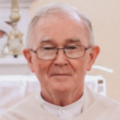
Fr Kevin O’Rourke SJ Vocations Director
“For us the question is not is the man good enough, but simply, does the hand fit the glove? We want him to be happy in this life.”
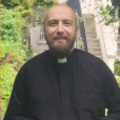
Ted Avram SJ
“Why the Jesuits? It started with gratitude. If you have ever been overcome with gratitude for everything, then you know that love and commitment follow. The salvation of Jesus Christ is a symphony with many themes and many calls. I suppose this is my call.”
St. Ignatius always encouraged people who are discerning to grow in inner freedom and availability to do God’s will, whatever that may be. The Spiritual Exercises end with this prayer of surrender to God’s will.
‘Take, Lord, and receive all my liberty, my memory, my understanding, and my entire will, all that I have and possess. You have given all to me. To You, O Lord, I return it. All of it is yours. Dispose of it according to your will. Give me your love and your grace, for this is enough for me.’
Every Jesuit novice does the Spiritual Exercises of St. Ignatius Loyola, a 30 day retreat in at atmosphere of silence, where he meditates on the scriptures and pays attention to how God is moving him and leading him. Every year we do an 8 day retreat. The experience of the Spiritual Exercises is formative.
The main devotion that we are associated with is the devotion to the Sacred Heart of Jesus. St. Claude de la Colombière, a French Jesuit, was sent to Paray-le-Monial to be the spiritual director of St. Marguerite Marie, the Visitation sister who received the visions of the Sacred Heart. Through St.Marguerite Marie the Jesuits received the mission (munus suavissimum) to teach about this incredible devotion.
To live a fruitful life as a Jesuit requires a great deal of interior freedom. What is this? A Jesuit aims to be relatively unattached to things of this world so that he can be wholly attached to God and God’s will.
A Jesuit does not seek his freedom in the satisfaction of all his personal preferences and appetites. Rather he finds his freedom in being available to do God’s will, so that he can go where he is asked to go. As you read about Jesuit saints, notice how free they were to do God’s will.
St. Ignatius wanted Jesuits to be “learned and poor.” Some Jesuits are academics who are fully engaged in the Church’s intellectual mission.
Many of us are not academics but we all aspire to be men with intelligent faith and a curiosity about the world. We hope that our culture fosters intellectual curiosity and depth.
A Jesuit’s formation (noviciate, philosophy, regency, theology, tertianship) takes place both in his own country and abroad. In recent years Irish scholastics (SJs who are in studies) have been sent to America, Canada and France for a course of studies.
A Jesuit may also discern a call to work in another country for a period. Jesuits from other countries also come to Ireland to study or work so our communities can have an international feel to them.
Some people say that priests and religious are meant to spend all their time doing explicitly “religious” things, e.g. celebrating mass, hearing confessions, preaching, praying, and that more concrete or practical activities ought to be left to the laity. This has never been the Jesuit way. Nor is it the way for many religious orders and congregations. Many do both!
The oldest form of religious life is monastic life and you are as likely to find a monk working in a field or a workshop as praying in a chapel. It is the same with Jesuits, only that we work in the world, not in a monastery. Of course we do a lot of explicitly religious and spiritual work, and this work is clearly very important in “post-Catholic” Ireland. But from the time of our foundation we have also been involved in initiatives that promote the material and social goods of the world, e.g. schools and universities, caring for the homeless, JRS. Working for a just social order is part and parcel of promoting the Kingdom of God in the world.
It is rare for a Jesuit to spend his life in the same job. He usually does a number of different things. He might spend some years working in a school or a university chaplaincy, then spend some time in a parish, before moving to a retreat centre. Furthermore, we don’t just work in Jesuit institutions — we also help other church organisations. For example, some Jesuits teach or give spiritual direction in diocesan seminaries.
Community is where we celebrate mass together, eat together and talk. Each community finds its own rhythm according to how many men live their, their work schedules, resources etc. One Jesuit is appointed as the superior of the community and he decides how to maintain a good community spirit.
The first two years of Jesuit formation is a school of the heart. Its goal is the verification of your vocation to the Society through discernment in the various probations and experiences.
After taking first vows, Jesuits normally move on to study philosophy. This is a time to develop one’s capacity for intellectual enquiry and philosophical argumentation.
After completing his studies in philosophy a Jesuit will normally take two years to engage in apostolic work. It will be an opportunity to experience working full-time and at length as a Jesuit and living in an active community.
For those Jesuits who enter the Society as candidates for priesthood, ordination to deaconate takes place during his third year of theology studies. He will then be ordained to the priesthood usually about six months after this.
The final element of formation before a Jesuit takes solemn vows is called the tertianship. It is, in effect, a second novitiate and represents a return to the school of the heart.
After the basic studies of philosophy and theology, all Jesuits will prepare for a particular type of work by following further studies. This will usually be after ordination.
We are very consoled by the fact that generous and gifted young men continue to join the Society. All of them are different and there is no ‘type.’ At the same time there are some important characteristics which we look for.
They are committed Catholics who want to be know, love and follow Jesus. They want to see renewal in Christ’s body, the church, so that it will be what it is meant to be AMDG!
They are faithful to the papacy. The Jesuit story started with St. Ignatius and his companion offering themselves to the Pope to be missioned by him. To be a Jesuit is to listen very carefully to what the Pope is saying and to do what he asks of us.
They have some education and life experience. We usually don’t accept young men who are just leaving school. Then again, the longer you wait to join the harder it can be to begin a new life. Most candidates fall into the 25-35 age bracket.
They are committed to Ireland but are open to the world. Joining the Jesuits means spending some time abroad and bringing that breadth of experience back home.
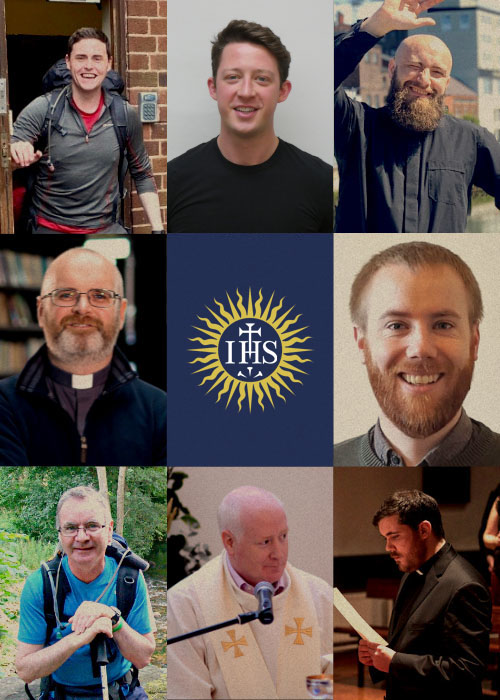
A man who is in the first stage of formation, the noviciate. After two years a novice takes vows of poverty, chastity and obedience and moves onto his years of studies.
A Jesuit who is studying for the priesthood
The period in between philosophy and theology studies when a scholastic does two years of active ministry. Many scholastics do this in a school.
Known as Fr. General, the general superior lives in Rome and is the head of the entire worldwide Order. The current general superior is Fr. Arturo Sosa, a Venezuelan Jesuit.
Known as Fr. Provincial, the provincial superior is the head of a particular province. The current provincial superior of the Irish Province is Fr. Leonard Moloney.
Each year every Jesuit has an open and transparent conversation with Fr. Provincial about his life. This conversation helps Fr. Provincial to decide what mission to give him.
My name is Niall Leahy SJ. I’m the Vocations Promotor for the Irish Jesuits.
I’m here to answer all of your vocations questions, so stop what you’re doing and take a few minutes to ask me your vocations questions, or let me know about your vocations journey!
You can use the form provided or connect with me via Social Media.
For non-vocations related queries, please use the Where We Are page to contact the person or works that can best answer your question.
